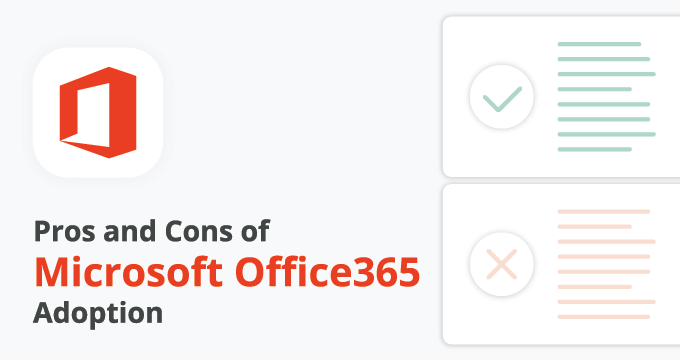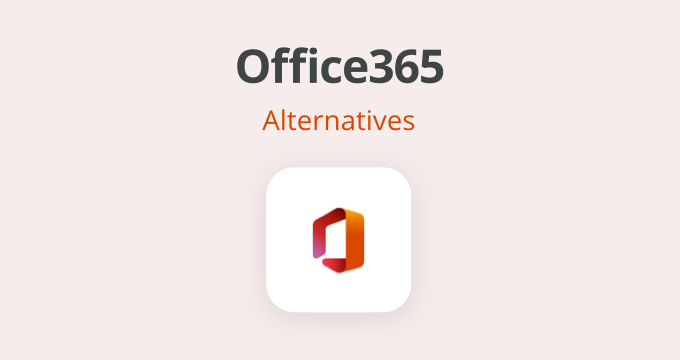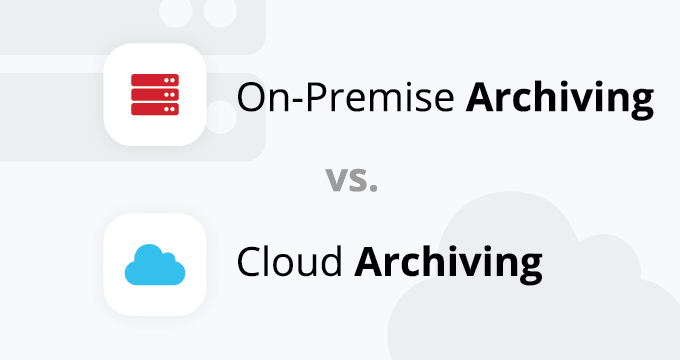With the increased need for agile, cost-efficient business environments, many companies turn to Software as a Service (SaaS) as the primary ecosystem – from management to communication and collaboration.
Building in-house infrastructure for operations is regarded as obsolete and expensive – and naturally, businesses strive to use the resources to gain more turn-around dollars. As a result, the adoption of cloud-based solutions like Microsoft 365 (until recently Office 365) is becoming more prominent among companies of all sizes.
However, the process isn’t simple, and businesses need to weigh the Office 365 pros and cons before committing to the adoption, especially concerning compatibility and technological requirements.
Deciding on the move to a cloud-based Office 365 requires assessing your particular situation: from the size and kind of your business to your team’s specific operational and collaboration needs. This article will show you how to approach this decision by providing an overview of Microsoft Office 365 implications.
As one of the most versatile cloud-based lines of subscription services, Microsoft 365 (formerly known as Microsoft Office 365) offers four pricing plans, ranging from $5-20 per user per month. Its offering includes hundreds of cloud-based apps.
However, suppose your business requires strict regulation and compliance to tend to your end-users security. In that case, you may need to put additional effort into cyber-proof security and email archiving. An on-premises solution may be more fitting in some instances, such as bulky security operations.
| Find out more: Guide to Microsoft Office365 Archiving |
Here are some essential Office 365 pros and cons laid out.
Microsoft 365 Pros
- Cost-effectiveness. Office 365 has become such a versatile app ecosystem that building in-house software becomes an unnecessary operational cost, especially if you have a smaller number of users. Paying the annual licenses amounts to substantially less than paying for in-house software. The subscription model comes with automatic upgrades, which makes maintenance no-cost. The bottom line: you pay for what you use, as the pricing is license-based.
- Affordable emailing. As Office 365 does not require a hosted exchange server (only on an opt-in basis), or an administrator, maintenance costs are low. Being cloud-based, it also lets you use your email anywhere. On top of that, the interface is simple enough not to require management by IT personnel. However, this option is available for larger enterprises that demand tighter control.
- Data storage. Every license holder can access OneDrive, which offers up to one terabyte of storage per user (depending on the plan). This cloud-based storage lets you share and sync all your work files, making the collaboration more secure and dynamic.
- Access to all types of files. Office 365 enterprise plans include access to essential work tools like Word, PowerPoint, Excel, and other apps via their web versions, enabling access to files from remote locations or any browser and device. Office 365 also provides mobile apps for handling files on the go.
- A rich array of tools. Besides the essentials, Office 365 can include access to SharePoint, Skype, and even more advanced platforms for internal communication and collaboration, such as Yammer, a business social network.
- Easy scalability. We already mentioned how cloud-based Office 365 reduces the infrastructural spend as it is subscription and pay-what-you-use based. While your business grows, you can add as many licenses as you need without other maintenance or development expenses.
- Robust security. Office 365 has strong security for end-users. Disclaimer: if your business requires strict compliance and adherence to security rules, Microsoft’s native security measures may not be enough.
Microsoft 365 Cons
- The cost. Ultimately, the cost-effectiveness can be listed both under Office 365 pros and cons, depending on your business needs and budget strategy. Your company may have a particular policy for operational costs and instead push the capital expenditure – in which case Office 365 may not be the best fit.
| Related: Affordable Office 365 Alternatives for Small Businesses and Startups |
- Configuring the infrastructure. As much as Office 365 works well for businesses that don’t require a particular configuration, it can restrain others that cannot fully reconfigure to the cloud operations. Some companies have a hybrid setup that encompasses both on-premises and cloud operations, and they may find Office 365 not fitting.
- Email limitations. Although limits on Office 365 enterprise plans are high, they still exist. Unlike with on-prem Exchange servers, these limits include how many emails you can exchange in a day. Plus, the number varies with the pricing plans.
- Email archiving. Suppose email archiving, FOIA management and ediscovery are essential features for your business. Office 365 archiving and ediscovery has limitations – for example, some companies require restrictions and specific policies for email archiving and retention. The Microsoft 365 ediscovery tool is also not part of every plan, and some enterprises may find it challenging to manage and administer. In that case, you may need to assess these options carefully and possibly opt for a third-party email archiving solution to ensure full compliance.
| Related: Guide to Microsoft Office365 Archiving |
- Security. Cloud-based security has been tighter than ever, and for most businesses keeping all the data on the cloud works. However, some industries (like financial services or hospitals that hold sensitive data and records) demand keeping the data on-premises due to regulatory constraints. In these cases, the cloud storage will not be satisfactory. Although Microsoft offers a solution even for these cases, they are pretty pricey and, in the end, still do not meet all the requirements.
Looking at the Office 365 pros and cons list is a good starting point for your decision on adopting the platform, but we recommend performing deeper research before committing.
First, we recommend gauging your needs and long-term business strategy so you don’t hit the wall in the foreseeable future with insufficient features. Careful assessment will help you understand the limitations and predict whether you’ll be able to circumvent them, either by adapting or by adding third-party vendors.
At Jatheon, we provide third-party archiving solutions for Office 365 users. Our on-prem and cloud solutions enable user-friendly, secure and precise search, FOIA management and ediscovery by automatic archiving of all your business communication. Contact us to learn more about what we can do for your business or book a free consultation with a custom-tailored demo.
Read Next:Affordable Office 365 Alternatives for Small Businesses and Startups Microsoft Exchange vs. Outlook Comparison: Which One to Choose? |










